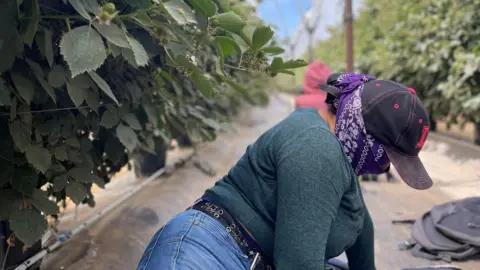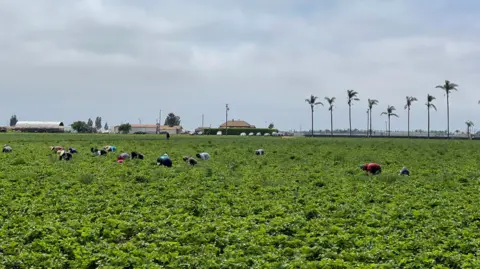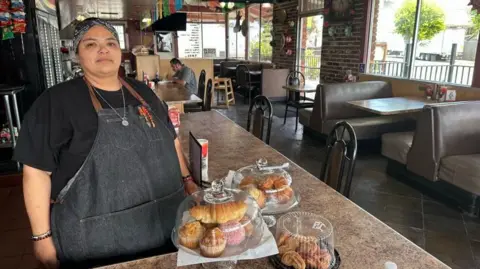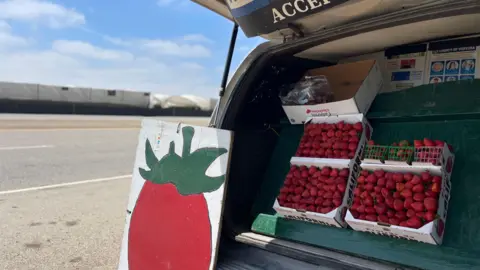ARTICLE AD BOX
Max Matza and Leire Ventas
BBC News
Reporting fromOxnard, California

 BBC News
BBC News
The women crouch down motionless, kneeling between endless rows of fruit bushes, almost hidden from view.
"Are you from ICE?" one of the women, a farm worker in a hat and purple bandana, asks us fearfully.
After assuring her that we're not with US Immigration and Customs Enforcement (ICE), which has been raiding nearby farms and arresting workers over the past week, she straightens her back, rising slightly out of the dirt.
"Have you seen any ICE vans? Are there patrol cars out there?" she asks, still unsure if we can be trusted and she can emerge.
The woman, an undocumented migrant from Mexico, has been picking berries in Oxnard, California since arriving in the US two years ago. It's a town which boasts of being the "strawberry capital of the world".
As her work shift ended on Wednesday, she and her co-workers hid in the fields, waiting to be picked up by a friend and unsure whether it was safe to venture out into the parking lot.
On the previous day, nine farms in the Oxnard area were visited by ICE agents, say local activists, but without search warrants they were denied entry and instead picked up people on the nearby streets, arresting 35.
The workplace raids are part of President Donald Trump's goal of arresting 3,000 undocumented immigrants per day. On the campaign trail he had vowed to deport noncitizens accused of violent crimes, a promise that received widespread support, even among some Hispanics.
But in Los Angeles there was a public backlash and street protests that sometimes turned violent, prompting him to controversially send in the military to the second largest city in the US.
"They treat us like criminals, but we only came here to work and have a better life," says the woman, who left her children behind in Mexico two years ago and hopes to return to them next year.
"We don't want to leave the house anymore. We don't want to go to the store. We're afraid they'll catch us."
Watch: Surveillance video shows immigration raid at Westchester Hand Wash
Large-scale raids on workplaces in California's agricultural heartland haven't been seen for the last 15 years, says Lucas Zucker, a community organiser in California's Central Coast region.
But that seems to have changed this past week.
"They are just sweeping through immigrant communities like Oxnard indiscriminately, looking for anyone they can find to meet their politically-driven quotas," he says.
More than 40% of US farmworkers are undocumented immigrants, according to a 2022 report by the US Department of Agriculture. In California, more than 75% are undocumented, according to the University of California, Merced.
Raids at farms and businesses that rely on the agricultural industry throughout California, and across the entire country, have ramped up this month.
The arrests have raised fears of shortages to America's food supply, if the migrants are arrested or forced into hiding, afraid to come to work.

 BBC News
BBC News
This impact has not been lost on the White House. Despite winning the election decisively after promising mass deportations, Trump on Thursday acknowledged the tough time his crackdown is inflicting on the farming sector.
"Our farmers are being hurt badly. You know, they have very good workers. They've worked for them for 20 years. They're not citizens, but they've turned out to be, you know, great."
In April, he said that some migrants may be authorised to continue working in the US, on the condition that they have a formal recommendation from their employer and that they first leave the US.


The result of one raid on Tuesday in Oxnard, a municipality 60 miles (100km) from downtown Los Angeles, can be seen in a video posted to Instagram by a local flower merchant.
The short clip shows a man running in a vast field of crops, through a haze of thick morning fog, as agents give chase on foot and in trucks. He is then seen falling to the ground, among the rows of plants, as agents move to arrest him.
When the BBC visited Oxnard on Wednesday, a US Customs and Border Protection (CBP) truck was seen parked outside an organic produce trucking company. A security guard insisted their visit was not related to immigration, saying: "This is not ICE. We would never let ICE in here."
Many tractors and trucks sat idle surrounded by acres of farmland, as an unknown number of workers chose to stay home.
The impact is having ripple effects on other businesses. Watching from her family's Mexican restaurant, Raquel Pérez saw masked CBP agents attempt to enter Boskovich Farms, a vegetable and herb packing facility across the street.
Now her business, Casa Grande Cafe, has only one customer during the normally busy lunch hour, because farm workers have stayed home. She estimates that at least half of her normal clientele are undocumented.
"No one came in today," says her mother, Paula Pérez. "We're all on edge."
Raquel says she's more concerned now for the future of the restaurant - serving chilaquiles, flan, and other Mexican delicacies - than she was during Covid, when her customers continued their work as usual, keeping the nation supplied with fresh foods.
"They don't realise the domino effect this is going to have," she says about the raids. Other companies around her that rely on agriculture have already been affected. The adjacent business buying and selling wooden pallets is closed, and a local car mechanic too.
"If the strawberries or vegetables aren't picked, that means there's gonna be nothing coming into the packing houses. Which means there's not gonna be no trucks to take the stuff."


A migrant selling strawberries from his truck on the side of the road says the raids have already had a devastating effect - on both his business and his hopes of becoming a legal resident of the US.
"Fewer people are going out for trips, and they buy less from me," says Óscar, who comes from the Mexican state of Tlaxcala and, while undocumented himself, has children who were born in the US.
"I'm scared, but I can't stop going out to work. I have to provide for my family," he says.
Óscar says he has been working to finalise his immigration status, but with ICE agents now waiting outside courthouses for migrants seeking to process paperwork, he's unsure of what to do next.
"There aren't many ways left to be here legally."

 15 hours ago
8
15 hours ago
8








 English (US) ·
English (US) ·